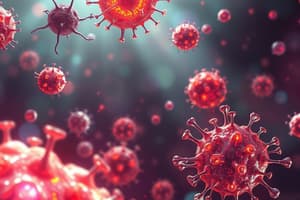Podcast
Questions and Answers
What is required for the expression of MHC molecules on endothelial or epithelial cells?
What is required for the expression of MHC molecules on endothelial or epithelial cells?
- Complement proteins
- Induction by IFN-γ (correct)
- Expression of TAPs
- Cytokines
Which type of genes are encoded in the MHC class III locus?
Which type of genes are encoded in the MHC class III locus?
- MHC allelic variants
- Complement proteins and cytokines (correct)
- Transporters associated with antigen processing
- Antigen processing proteins
What kind of genetic variability is exhibited by the MHC class I and II genes?
What kind of genetic variability is exhibited by the MHC class I and II genes?
- High genetic variability (correct)
- No genetic variability
- Moderate genetic variability
- Low genetic variability
How many allelic variants have been defined at some HLA loci?
How many allelic variants have been defined at some HLA loci?
What did genetic mapping studies show about the MHC genes in different individuals?
What did genetic mapping studies show about the MHC genes in different individuals?
What type of structure was revealed for the MHC classes I and II proteins in 1987?
What type of structure was revealed for the MHC classes I and II proteins in 1987?
What is the primary function of adjuvants in vaccine design?
What is the primary function of adjuvants in vaccine design?
Which of the following statements about anti-drug antibodies is correct?
Which of the following statements about anti-drug antibodies is correct?
What is the primary function of the major histocompatibility complex (MHC) molecules?
What is the primary function of the major histocompatibility complex (MHC) molecules?
How does the T-cell receptor (TCR) recognize antigens compared to antibodies?
How does the T-cell receptor (TCR) recognize antigens compared to antibodies?
What is the significance of the major histocompatibility complex (MHC) in transplantation rejection?
What is the significance of the major histocompatibility complex (MHC) in transplantation rejection?
Which of the following statements about T-cell receptors (TCRs) and MHC molecules is correct?
Which of the following statements about T-cell receptors (TCRs) and MHC molecules is correct?
Which of the following is NOT a key exception to MHC class I molecule expression?
Which of the following is NOT a key exception to MHC class I molecule expression?
Which of the following is a key function of the HLA-D locus-encoded molecules?
Which of the following is a key function of the HLA-D locus-encoded molecules?
Which of the following is a key difference between MHC class I and class II proteins?
Which of the following is a key difference between MHC class I and class II proteins?
What is the primary role of the MHC in the immune system?
What is the primary role of the MHC in the immune system?
How do differences in the allelic forms of the HLA-D locus-encoded genes affect the immune response?
How do differences in the allelic forms of the HLA-D locus-encoded genes affect the immune response?
Flashcards are hidden until you start studying
Study Notes
Protein Drug Design and Immunogenicity
- Methods to reduce immunogenicity are crucial in protein drug design due to individuals producing anti-drug antibodies, which can inhibit drug efficacy.
Antigen Recognition Molecules
- The major histocompatibility complex (MHC) is responsible for T-cell antigen recognition and plays a significant role in controlling various immunologic functions.
MHC Molecules
- MHC molecules bind peptide antigens and present them to T cells.
- The T-cell receptor (TCR) recognizes peptide antigens presented in the context of the MHC molecule on the antigen-presenting cell (APC).
- The TCR is specific for antigen, but the antigen must be presented on a self-MHC molecule.
MHC Genes and Polymorphism
- The MHC genes exhibit extraordinary genetic variability, with over 300 different allelic variants defined at some HLA loci.
- Each individual inherits a restricted set of alleles from their parents, known as a haplotype.
MHC Proteins Structure and Function
- The three-dimensional structure of MHC classes I and II proteins was revealed through x-ray crystallography in 1987.
- MHC class I protein structure resembles a cleft occupied by a peptide, demonstrating MHC restriction.
Human MHC Complex (HLA)
- The human MHC is located on chromosome 6 and is composed of classes I, II, and III MHC proteins.
- MHC class I proteins are encoded by the HLA-A, B, and C genes and are expressed on nearly all nucleated cells.
- MHC class II proteins are encoded by the HLA-D region and are constitutively expressed on macrophages, dendritic cells, and B cells.
Studying That Suits You
Use AI to generate personalized quizzes and flashcards to suit your learning preferences.




